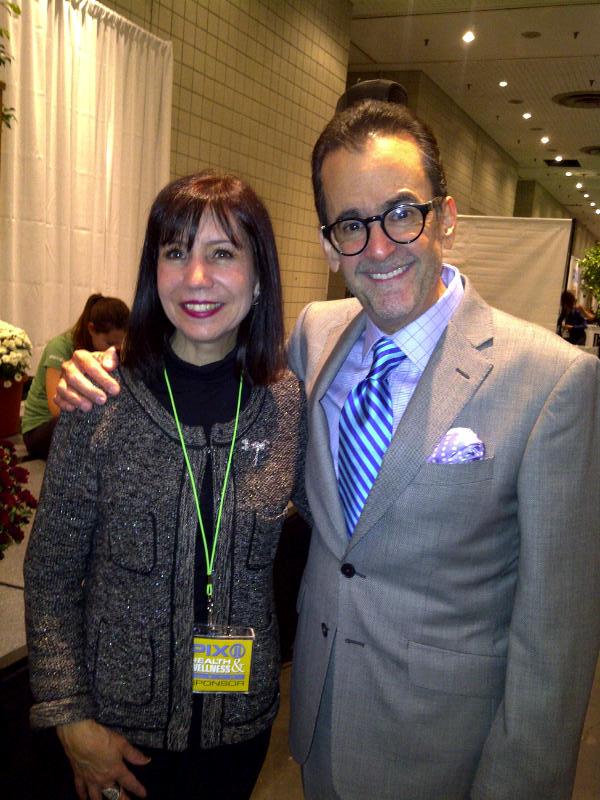Diane DiResta has just written a new ebook, Give Fear the Finger: How to Knock Out Fear of Public Speaking. DiResta’s mission is to inspire every person to take center stage and move out of the shadow of fear. Knowing it’s possible, DiResta shares success stories of clients who were willing to step up and succeeded in public speaking.
Even Celebrities Screw Up Their Presentations
Most public speakers fear that they will bomb when delivering their presentations. That same performance anxiety affects actors and musicians - even seasoned celebrities. Murphy's Law applies to the best of us. It's inevitable that at some point, something will go wrong with your presentation performance. So how do you recover? A few nights ago in Toronto, Billy Joel forgot some lyrics. Watch how he recovers on stage:
Those of us who are not celebrities can learn a thing or two from those who are. We can't all be as direct in our response as Billy Joel was, but we can develop some recovery strategies. Here's a quick tip on how you can plan for that moment when Murphy's Law finds you making a mistake on the platform:
You don't have to be a perfect public speaker. Confidence is about how your recover from a public speaking faux pas. Plan your recovery strategy, implement it with grace, and carry on. Your audience will like you Just the Way You Are.
How have you recovered from a speaking blooper?
Don't Let What Happened to Michael Bay Happen To You
What's a public speaker's worst nightmare? It's what happened to Michael Bay. Going blank and not knowing what to do can cause any speaker to freeze with fear. I saw this happen during the December holidays at a networking party. The event took place in a large store with a winding staircase in the middle of the room. Each speaker climbed a few stairs and then talked to 50 women who were standing around. The third speaker ascended the stairs and began to talk about hair care. He started out fine. But a few minutes into it he said, "I'm sorry " and left the building. We didn't know what hit us.The audience didn't see that coming. But something happened inside to trigger a panic attack. Michael Bey was interrupted by the emcee, lost his place on the teleprompter and couldn't recover. He walked off. It was a painful moment for him, the emcee, the sponsor, and the viewers. What could he have done? What would you do?
http://www.youtube.com/watch?v=XlC-VIX9Gyg
The best preparation aside from rehearsing is to know your worst case scenario and plan a recovery strategy.
Have a Backup Script-If you ever speak from a teleprompter, have a back-up script. Although not ideal, Michael could have taken the script and continued the presentation.
Play it Again Sam-If the technology goes down or the teleprompter malfunctions, call it out and ask them to restart. I once saw a Miss Universe pageant. The contestant began her presentation in English and then got flustered. Instead of dying on the platform, she announced that she was going to continue in French. The audience encouraged her with applause.
Stop and Breathe-Public speaking success is not guaranteed. If you experience brain freeze, take a moment to focus on your breath. This will help you come back and regain your composure. People walk off in a panic because they don't know what to do. Too many public speakers fear silence. So they exit the stage. You don't have to act immediately. Pause and breathe to come back into your body.
Fire an Anchor-This takes preparation. Create a physical anchor, or word that will trigger you back into confidence. Fire it and expect to experience a state of excellence where you have that "can do" attitude. You can give fear the finger.
Let Go and Go with the Flow-When disaster strikes, take a lesson from martial arts. Don't fight against the energy. Use it. Disarm your opponent. In this case, the opponent is fear.
The best public speakers are prepared and then let go. Nobody is better at this than Bill Clinton. During one of his presidential speeches he realized that somebody put the wrong speech in the teleprompter. He was able to wing it until Hillary could notify the person responsible. .If you're wedded to every word you will have a difficult time as a public speaker.
When Michael's speech was out of sync with the teleprompter, the emcee asked him a question about the slides.That was the opportunity to let go of the script and to have a conversation.The presentation could have morphed into an interview and Mr. Bay could have remained on stage.
The Lesson? In the arena of public speaking, it's not always what you say, it's how you recover. If at all possible, avoid using a teleprompter. Be prepared and know this too,will pass.
What was your worst public speaking moment? What did you do?
What Would Diane DiResta Do? A TED Speaker's Worst Nightmare
I watched this video over the weekend, and while I agree that the prank was well-executed*, I couldn't help thinking about reality. The reality is that public speakers run into technology snags all the time. The possibility of a tech glitch is one of many reasons people fear speaking in front of an audience. What would you do if this happened to you?
It is so important to be prepared for the worst when you go in front of an audience. What if your PowerPoint deck doesn't load? What if your clicker runs out of batteries? What if your microphone doesn't work? There are so many examples of speaking disasters. Your best bet is to have a recovery strategy:
Some speaking glitches are avoidable, and you can download our free presentation checklist to help prevent them. But there are many problems that you can't control. For those, you have to be prepared.
Prepare your speaking recovery strategy before your big day. This will increase your odds of a graceful recovery in the face of disaster. Knowing that you are prepared for any eventuality will also boost your confidence when you step onto the stage. Now go out and give a Knockout Presentation!
*The speaker in this video is a comedian and was in on the prank.
The One Word That Will Get You What You Want
 On Monday, I decided to try a test. I declared my intention that I was going to book business on that day. I didn't know how. I didn't know where it would come from. I didn't start calling a list of numbers. By late afternoon, I went to my inbox and there was an email. It said, "Could you send us dates when you are available?"
On Monday, I decided to try a test. I declared my intention that I was going to book business on that day. I didn't know how. I didn't know where it would come from. I didn't start calling a list of numbers. By late afternoon, I went to my inbox and there was an email. It said, "Could you send us dates when you are available?"
BINGO!
The email was from a new prospect. We had a prior conversation, but no commitment had been made. There was only one problem with this manifestation. They were asking for dates in January. I forgot to tell the universe I wanted the business for October. So on the one hand, I was happy with my quick manifesting skills. On the other hand, I was laughing to myself because I should know better. The universe is literal. The subconscious mind is literal. If you're not specific, it causes confusion. And while you may manifest, it doesn't come to you in the way that you desire.
There's one magical word that we all learned as children: Abracadabra. This literally means, "I create as I speak." But you need to be specific. It's the same with communication. You say the word car. You're envisioning a Mercedes, and somebody else is seeing a Prius. Same word, different pictures. The more specific we are in the way we communicate, the more effective we'll be in our conversations and presentations. And the more we will manifest and get what we want.
I've been reading a lot about quantum physics lately. This is not airy fairy, positive thinking. Science is now explaining how matter materializes, and it's all about thought and energy. So what are you giving thought and energy to in your presentations? In your communication? In your life? Are you being specific?
Fear of speaking is an old model. It doesn't have to be that way. Simply by changing how you think and speak about presentations can totally change your experience. Affirm what you want. Aim to be a quantum communicator and start manifesting success in all of your interactions and presentations.
Do You Have Your Public Speaking MBA?
 On Saturday, October 19, I spoke at the WPIX, Channel 11 Health & Wellness Expo at the Javits Center in New York City. I was in good company with celebrity speakers like Dr. Steve, Dr. Ian Smith, Lionel the WPIX commentator, and others. My presentation, Mind Body Speaking: The Key to Confidence, was well-attended. Every seat was filled, and there were people standing to hear the message.
On Saturday, October 19, I spoke at the WPIX, Channel 11 Health & Wellness Expo at the Javits Center in New York City. I was in good company with celebrity speakers like Dr. Steve, Dr. Ian Smith, Lionel the WPIX commentator, and others. My presentation, Mind Body Speaking: The Key to Confidence, was well-attended. Every seat was filled, and there were people standing to hear the message.
When I asked the audience what they wanted to learn, the unanimous response was confidence. During the talk, I introduced the topic of a public speaking MBA. MBA stands for Mind, Body, Audience.
The first goal is to manage your mind with positive intentions. The audience created three positive I Am statements to say to themselves before a presentation. They learned how to get centered in their bodies by focusing on the breath, and by participating in empowering body postures. Finally, they learned how to make an "I" connection with individuals in the audience to create a relationship.
They walked away with practical tools and the understanding that the mind is the key to successful public speaking.
Change Your Words To Change Your Mind: Public Speaking Affirmations
 Public speaking is still the number one fear. This was originally publicized by the 1977 Book of Lists. It's 2013 and I don't need another list to prove the case. Fear of speaking tops the list of reasons people hire me.
Over the years in my living laboratory, coaching, training and speaking to audiences from 1 to 1,000, it's become very clear that there are two secrets to mastering public speaking: skill set and mindset.
Public speaking is still the number one fear. This was originally publicized by the 1977 Book of Lists. It's 2013 and I don't need another list to prove the case. Fear of speaking tops the list of reasons people hire me.
Over the years in my living laboratory, coaching, training and speaking to audiences from 1 to 1,000, it's become very clear that there are two secrets to mastering public speaking: skill set and mindset.
Even when my clients have public speaking skills, it's their thinking that trips them up. I've discovered that fear is about living in the future. Many public speakers envision unsuccessful presentations in their minds and you can hear it in their language.
Successful presenters live in the present. They speak in the moment. They're totally present with the audience. They speak confidently and affirm their success. The two most powerful words are "I Am". By making "I Am" statements, you claim your success in the here and now.
And that's why I was motivated to create this video of public speaking "I Am" affirmations for my clients and the world. We just launched this free YouTube video so that anybody can say these affirmations every morning and right before a presentation. When people are in a habit of saying negative things, they don't really know what to say to themselves to change the message. These words of affirmation are set to relaxing music so that public speakers can program themselves for success and give a knockout presentation.
Click on the video to train your mind for successful speaking.
Hillary Clinton's Face Improves Women's Public Speaking
Fear of public speaking continues to be a top fear for both men and women. Overcoming public speaking fear is a must for anyone who is serious about success. I know a lot about boosting public speaking confidence. I use a number of techniques to help my clients master public speaking and overcome their fear and anxiety. In the 20 years I've been in business, I've utilized many approaches including breathing, NLP (neurolinguistic programming), acupressure, etc.
But for the first time, there is a technique that never occurred to me.
According to a study in the May issue of the Journal of Experimental Social Psychology, women and men each spoke before an audience. The researchers placed a picture of Bill Clinton on the back wall in one room and a picture of Hillary Clinton in another room. Some back walls were blank. The women who presented in the room with Hillary's picture on the wall performed better and gave longer speeches. The evaluations were more positive for the women who spoke in the room with Hillary's photo.
This study takes the impact of female role models to a whole new level. While I don't recommend simply pasting Hillary's picture on the wall and expecting a standing ovation, presenters who've worked on their speaking skills and still feel anxious may benefit by imagining their role model. To read the entire article, click here.
Here are some of my resources for public speaking fear and nervousness:
Your Brain on Stage Fright
 Some call it flop sweat. Others call it stage fright. Whatever you call that tightness in the pit of your stomach, sweaty palms, and racing heart, we've all experienced it. Public speaking still ranks as a top fear. Even professional speakers feel nervous when the stakes are high. Fear of public speaking has always been a mystery. Why does it happen?
How does nervousness manifest? Why does the thought of public speaking send some people into a tailspin? Imagine going about your day, and suddenly your manager says you're expected to give a speech. In an instant, nervousness descends like a wave washing over you. What's going on in the brain?
Some call it flop sweat. Others call it stage fright. Whatever you call that tightness in the pit of your stomach, sweaty palms, and racing heart, we've all experienced it. Public speaking still ranks as a top fear. Even professional speakers feel nervous when the stakes are high. Fear of public speaking has always been a mystery. Why does it happen?
How does nervousness manifest? Why does the thought of public speaking send some people into a tailspin? Imagine going about your day, and suddenly your manager says you're expected to give a speech. In an instant, nervousness descends like a wave washing over you. What's going on in the brain?
When I polled people for my book, Knockout Presentations, I asked them why they felt nervous speaking in public. The thread running through most of the responses was the fear of humiliation. Well, it turns out that we're hard wired to worry about our reputations.
Did you know that fear is a primitive reaction to protect our bodies? Some people get more nervous than others and there is a reason for that. There are three main things that affect how you experience stage fright.
Find out in this article on the science of stage fright.
Give Fear the Finger
If you're like most people, you avoid public speaking like the plague. But that's a recipe for failure. Successful people must have good presentation skills and speak to build their reputations and expertise. What most public speakers do, is resist their fear and what you resist, will persist. Here's another idea. Instead of trying to control your thoughts, use your body and give fear the finger. Watch this video to learn how:
http://youtu.be/BxKEBN2RqR0
Confidence is King
I just read an article from James Caan, CEO of Hamilton Bradshaw, entitled, Confidence is King. He writes:
 "Ask any businessman or woman and they will tell you the same thing – confidence is a vital ingredient in the recipe for success. In other words, if you want to be really good at anything - no matter what walk of life you are involved in - you need to have belief in yourself and your abilities."
"Ask any businessman or woman and they will tell you the same thing – confidence is a vital ingredient in the recipe for success. In other words, if you want to be really good at anything - no matter what walk of life you are involved in - you need to have belief in yourself and your abilities."I work with leaders to build confidence in all their communications and the biggest hurdle is fear of speaking. So I created a series of videos on my YouTube channel for conquering fear of public speaking:
Are You Seen But Not Heard?
Karen was newly appointed to her position in finance, where she was responsible for managing and keeping the department on budget. Soft-spoken and petite, Karen had a hard time making herself heard during meetings, as her aggressive team shouted over her and challenged her when she questioned their figures...
Would You Rather Die Than Give a Speech?
Jerry Seinfeld once told a famous joke about public speaking:
According to most studies, people's number one fear is public speaking. Number two is death. Death is number two. Does that sound right? This means to the average person, if you go to a funeral, you're better off in the casket than doing the eulogy."
It turns out Jerry Seinfeld was wrong. According to our quiz, Presentation Panic Quotient, only 18% would rather die than give a speech. That's good news. We expected fear of speaking to be much higher. To learn their PPQ, respondents ranked themselves according to their level of public speaking nervousness and received a final score.
According to people who took the quiz, the PPQ is a great reality check. To determine your Presentation Panic Quotient watch the video and click on the link.
It was interesting to find out the nervous public speaking habit that had the highest ranking. What do you think was the number one nervous symptom when speaking in public? Let us know in the comments.
Fear of Public Speaking Series: Plan a Recovery Strategy
Murphy's Law will happen during one of your presentations. Guaranteed. The challenge is what to do about it. The pros don't get rattled by mishaps. They plan for them. Confident speakers know when accidents happen - they can handle them. That's because they anticipate and plan a recovery strategy. Anyone can deliver a good presentation when things are going smoothly. But when disaster strikes, the great public speakers rise to the occasion and put their best public speaking foot forward.
Fear of Public Speaking Series: Visualize Success
Visualization is the key to effective public speaking. You have the power to create your desired speaking outcome. Why would anyone choose fear? Choose confidence. Visualize success. Learn how.
Fear of Public Speaking Series: Change Your Thinking
Think positive! Fear is "stinkin' thinkin'. You have more power than you think. And it's all in your mind. Confident Public speaking is a state of mind.
Fear of Public Speaking Series: Focus on the Breath
Public speaking doesn't have to evoke fear. Breath deeply. When we're in a fear state we tend to hold our breath. Psychologist Roger Wolger once said something to the effect of " Anxiety is an interruption in respiration." To work through fear, breathe deeply. Focus on the breath.
Fear of Public Speaking Series: Prepare and Rehearse
This may be common sense, but most people don't prepare and rehearse as much as they should. You can minimize fear simply by rehearsing. Practice your presentations to be a confident public speaker.
15 Tips to Conquer Fear of Public Speaking
 July is Freedom from Fear of Speaking Month. Summer is a good time to take a public speaking class, get a coach and knockout fear of speaking. Here are 15 tips to help you become a confident public speaker.
July is Freedom from Fear of Speaking Month. Summer is a good time to take a public speaking class, get a coach and knockout fear of speaking. Here are 15 tips to help you become a confident public speaker.
- Get over yourself Fear of Speaking - Nervousness is being self-centered. It's not about you-it's about them. The audience wants you to succeed.
- Focus on the breath - Breathe through the diaphragm of belly. Take 5-10 deep cleansing breaths.
- Prepare and Rehearse - Practice out loud and time your speech. Videotape yourself. You don't look as nervous as you feel.
- Set an anchor - Remember a time when you were at the top of your game. Get the feeling. Press your index finger and thumb together and anchor it. Press your fingers together right before you speak.
- Affirm your success - Overwrite negative programming by writing positive statements and say them to yourself. "I'm confident." "I can do this."
- Arrive early - Mingle with others and you'll feel like you have friends in the audience.
- Visualize your outcome - Create the outcome you want in your mind. Imagine every step of your presentation until the outcome is exactly the way you want it.
- Transfer your nervousness - Squeeze a small foam ball in your hand.
- Make contact with a friend - Look at a friendly face and smile. You'll feel you are supported.
- Plan a recovery strategy - Imagine your worst scenario and plan how you'll handle it in advance. Humor works great.
- Take time to pause - Stop for 3 beats of silence at the end of as sentence. You'll be able to catch your breath and think.
- Make your fear smaller - Imagine your fear as a fiery ball. In your mind's eye, shrink it and move it far away.
- Express your passion - Get excited and involved in your message or story and pretty soon you'll forget yourself.
- Meditate - Ten minutes of meditation will calm and focus your mind.
- Work the room - Release energy through moving to different parts of the room and using gestures. You'll feel energized.
What are your favorite tips for conquering fear of public speaking?
Do You Have a Public Speaking Anchor?
Imagine you're sailing. You find a spot where you want to go snorkeling. You drop an anchor and you dive off the boat. You enjoy your underwater adventure as you experience all kinds of marine life. You know when you're ready, the boat will be waiting for you. But what if there were no anchor? The boat would drift away and you'd be left on your own to tread water. It's no different with public speaking. Many people fear speaking because they don't know how to anchor themselves. As their presentation drifts along they become more nervous. In this video, you'll learn about simple public speaking anchors you can use to start speaking with confidence.



